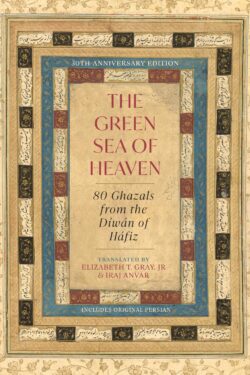Eighty Ghazals from the Diwan of Hafiz
Translated by Elizabeth T. Gray, Jr. & Iraj Anvar
Paperback
978-1-958972-35-9
US $35.00
eBook available
December 2024
Authoritative edition of Hafiz’s most important poems, including original Persian and brilliant English translations
Recent translations of Hafiz have been controversial. Omid Safi, an Islamic studies scholar at Duke, notes that “there are so many fake translations of Hafiz floating around, offering ‘versions’ that have no earthly connection to anything that the Persian poet and sage of Shiraz named Hafiz ever said. Elizabeth Gray offers us something different: poetic translations rooted in close readings of the original Persian, developed in consultation with a native speaker scholar.”
A “ghazal” is usually understood to mean lyric poetry concerned with love. But what had been a courtly love lyric concerned with wine and physical beauty became, in the hands of Sufis like Farid ud-Dín ‘Attar and Jalal ud-Dín Rumi, a way to describe a mystic’s relationship with God. Ghazals also became a means of veiling from theological and political conservatives the Sufi belief in the possibility of an intuitive, personal union with God.
Háfiz became the greatest of all Sufi poets, called the “Tongue of the Invisible” and the “Interpreter of Mysteries.” His command of the ghazal’s traditional imagery and themes blends eroticism, mysticism, and panegyric into verse of unsurpassed beauty. His eighty ghazals are presented in this book. Persian originals appear on facing pages to brilliant English translations of Gray and Anvar.
In the afterword, Persian scholar Daryush Shayegan notes how “there is no antagonism between the earthly wine and the divine wine, just as there is none between profane love and the love of God, since one is the necessary initiation to the other.”
Author Bio
Elizabeth T. Gray, Jr. is a poet and translator whose selection of poems by Iran’s iconic female poet Forough Farrokhzad (1934-1967), Let Us Believe in the Beginning of the Cold Season (New Directions, 2022) was a finalist for the 2023 PEN Prize for Poetry in Translation. Her own books of poetry include Salient (New Directions, 2020). She serves on the boards of The Beloit Poetry Journal, Kimbilio Fiction, Friends of Writers, and the Abdorrahman Boroumand Center for Human Rights in Iran, and from 2009-2015 served as chair of the board of the Iran Human Rights Documentation Center. She holds a BA and JD from Harvard University and an MFA from the Program for Writers at Warren Wilson College. She lives in New York City. www.etgrayjr.com.
Iraj Anvar is an actor, singer, stage and film director, writer, translator, and educator. He completed his first diploma in Genoa, Italy at the Swiss School, then gained a degree in acting and directing at Alessandro Fersen's Studio di Arti Sceniche in Rome, Italy. On returning to his native Tehran, he co-founded the Tehran Theater Workshop where he directed and performed in many stage and television productions and translated plays and film dialogue into Persian, including European plays he directed for the stage. He also taught acting and diction at Tehran University. A few months before the 1979 Islamic Revolution, he moved to New York City, where he received his PhD in Middle Eastern and Islamic Studies at NYU where he taught Persian language and literature for several years. In New York, he has read and sung Rumi, Hafiz, and other classical poets in Persian and in his own translations at the Asia Society, Cathedral of St. John the Divine, St. Bartholomew's Church, the Long House Preserve Garden, the Bowery Poetry Club, Stony Brook, and several other institutions.
Praise
“Achieves the almost impossible, rendering the virtually untranslatable Hafiz into beautiful and accurate poetry. There are so many fake translations of Hafiz floating around, offering ‘versions’ that have no earthly connection to anything that the Persian poet and sage of Shiraz named Hafiz ever said. Elizabeth Gray offers us something different: poetic translations rooted in close readings of the original Persian, developed in consultation with a native speaker scholar.” —Omid Safi, Professor in the Department of Asian and Middle Eastern Studies at Duke University; author of Memories of Muhammad and Radical Love: Teachings from the Islamic Mystical Tradition
“This is a groundbreaking work, one that places the ghazal of Hafiz into a contemporary English poetic idiom. After too long a wait, we encounter Hafiz, come alive in an English style that is at once natural and intricate. This is a remarkable achievement.” —Michael Sells, John Henry Barrows Professor of Islamic History and Literature in the Divinity School and in the Department of Comparative Literature at the University of Chicago; author of Mystical Languages of Unsaying and Approaching the Quran
“These are truly remarkable and moving translations: the first English versions of Hafiz to read as poetry while still capturing the unique qualities of concision, multivalent meaning and spiritual depth which have for centuries made his Persian ghazals the acknowledged masterpiece and exemplar of poetic art throughout the Eastern Islamic world.” —James W. Morris, Professor of Islamic Studies in the Theology Department and Islamic Civilization and Societies Program at Boston College; author of The Reflective Heart: Discovering Spiritual Intelligence in Ibn ‘Arabī’s "Meccan Illuminations” and From the Qur’an to the Islamic Humanities
“Translating the untranslatable Hafiz is a most daunting project, one that Gray and Anvar have accomplished with considerable literary sensibility, grounded in their solid scholarly reading of the original Persian. These approachable, skilful English renderings will appeal to anyone seeking to understand Hafiz in the context of his medieval Muslim world.” —Dominic Parviz Brookshaw, Professor of Persian Literature and Iranian Culture at the University of Oxford; author of Hafiz and His Contemporaries: Poetry, Performance and Patronage in Fourteenth-century Iran




